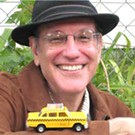Published March 6, 2013 at 9:01 a.m.
The fare was to Hogansburg, New York, the main town of the St. Regis Mohawk Reservation. The Mohawk Indian name for the reservation is Akwesasne.
I’m honestly unsure whether it’s insensitive to employ the term “Indian” as opposed to “Native American.” The native people I’ve run into through the years seemed comfortable referring to their heritage as “Indian,” so there’s one indicator. And the customer, Ronald Deseronto, whom I was driving on this brisk winter afternoon immediately identified himself as a “full-blooded Mohawk Indian,” so I’m going with that.
Ronald’s Indian pedigree was evident in his appearance. His eyes were dark and wide set on a broad face with high cheekbones. Despite his age, his hair and eyebrows — undyed, to my eyes — were sheer black. Observing his weathered skin, all I could think of was a fading sunset.
He had just been released from Fletcher Allen. It could have been heart; it could have been kidneys. I didn’t ask, and he didn’t tell. But he was 74 years old and talky, which pleased me to no end; the ride to Hogansburg would take more than two hours, and I had a feeling Ronald would have nothing but fascinating stories to tell.
As we made our way beyond the Burlington environs, I said, “I grew up in New York City, and there was one Mohawk Indian kid I remember from the neighborhood. His name was Rainbow, or at least that’s what everybody knew him as. I recall him telling me that his dad worked on the ‘high steel,’ building the skyscrapers in Manhattan.”
“Oh, yeah, I did that, too,” Ronald said.
“You did? In New York City?”
“No, never down there, but I walked the high steel in cities all over New England. Not for too long, though. I hated it. Us Indians are supposed to have this great balance, right? Well, I sure didn’t.”
“So I wondered about this — on the reservation, are hunting and fishing still a big part of people’s lives?”
“Yeah, it is for some folks, but not me. My dad tried to get me into it, but I never would hunt with him. One time he did convince me to go out fishing. He set me up on the lakeshore, and I put some worms on the hook and gave it a go. The next thing I know, a huge black eel leaps out of the water and around my neck. I was screaming, scared out of my mind! My father yanked it off, and I told him, ‘Well, pops — that’s it for fishing.’ Luckily, my sister was a real outdoors girl, so he could always do that stuff with her.”
“That’s a great story,” I said, at the same time wondering how true it could be. Can an eel really do that? Who cares? I decided. “So could I ask you another question about life on the reservation? Do you mind?”
“Be my guest,” he replied.
“Are there still traditional healers? You know, what the white people would call ‘medicine men’?”
“Oh, sure,” Ronald said, “there are still healers.” He paused for a moment, then added off-handedly, “Yeah, I’m one.”
“Really?” I said. “How does that work? I mean, were you taught by an elder?”
“It was my grandmother. She was known as a great healer. She could cure any ailment — physical, emotional, spiritual, it made no difference. And that was the problem. Folks were constantly coming over to the house. She didn’t have a moment of peace. That’s why I never really pursued that way of life.”
“Don’t the healers have, like, protection to take care of themselves?”
“Oh, sure, we have this,” he said, pulling a necklace out from beneath his shirt. It was a leather strand with a small pouch on the end. “Anyway, this healing power is something from birth. It’s known as the ‘shield.’ From when I was little, the elders would say they saw it in me, that I had the shield.”
“So you’ve never used this ability, this power?”
“Very rarely. Once I was working for this white man off the reservation. I was out at his house for some reason. His young son was crying and crying, and the man’s wife said, ‘Don’t bother with him. He’s a sissy. It’s just an earache.’ I felt bad for the kid and asked if she wouldn’t mind if I healed him. She said OK, and I came back later that day with some skunk oil, which I heated and applied. The kid was fine in a matter of minutes.
“The next day we were doing some construction work at the kid’s school, and he saw me and got very excited and ran up to me yelling to his classmates, ‘That’s my Indian! That’s my Indian! He cured me.’ I thought that was kind of funny, but I just don’t like the whole business.”
We gabbed our way clear across upstate New York — west on Route 11 all the way, until we turned onto 37 for the final leg. And the talk was not just about Indian matters. As we crossed onto Mohawk land, Ron pointed out various houses and landmarks. He seemed to be intimately familiar with every road, every field, every building.
As we had grown quite at ease with each other, I jested, “So Ron — what kind of Indian are you, anyway? You don’t fish, you don’t hunt.”
Dialing up his formidable deadpan, he said, “I hunt pussy.”
I turned to sneak another gander at this 74-year-old man and thought, That’s kind of crude, but I’d bet he does just fine with the ladies. Though no outdoorsman, he was still quite masculine, with charm to spare.
“Like at church, I have my eye on this one woman, this beautiful, widowed Latin lady. There’s something about her. She has this wiggle in her walk.” He shot me a smile, raising his eyebrows. “Anyway, it’s going to happen. I just know it.”
The strains of “Always on My Mind” came drifting from the radio, and Ronald said, “Turn it up, man — that’s Willie. I love this song.” I did, and he began to sing along. His voice was sonorous and soulful, like an old country crooner. I told him so, and he said, “I just love that country music. Always have.”
“So getting back to this Latina widow,” I said. “She sounds terrific. What’s her name?”
My customer laughed and said, “Don’t you worry about her name.”
“Ronald — come on, brother. It’s not like I’m gonna go after her.”
He winked at me and said, “Every story needs a mystery.”
More By This Author
Speaking of Culture
-

Video: Musicians Jeremiah and Annemieke McLane Move into their New Home
Mar 24, 2022 -

Creating Art That Celebrates the Culture and Climate of Places Around the Globe
Jun 29, 2021 -

Video: Storyteller Ferene Paris Meyer Inspires a Juneteenth Mural
Jun 17, 2021 -

Arts and Culture Nonprofits to Receive $5 Million in State Relief Grants
Jul 7, 2020 -

18 Elm in Waterbury Creates Community at the Table
Jul 9, 2019 - More »
Comments
Comments are closed.
From 2014-2020, Seven Days allowed readers to comment on all stories posted on our website. While we've appreciated the suggestions and insights, right now Seven Days is prioritizing our core mission — producing high-quality, responsible local journalism — over moderating online debates between readers.
To criticize, correct or praise our reporting, please send us a letter to the editor or send us a tip. We’ll check it out and report the results.
Online comments may return when we have better tech tools for managing them. Thanks for reading.










































